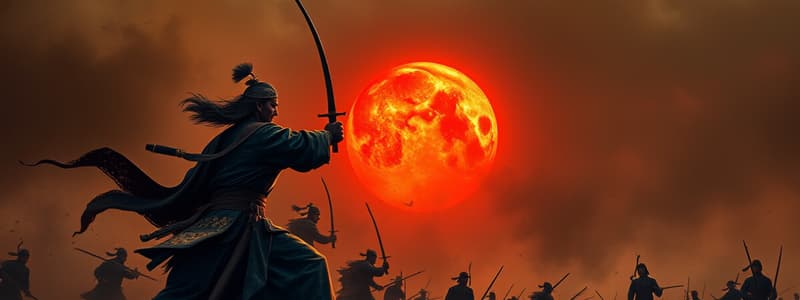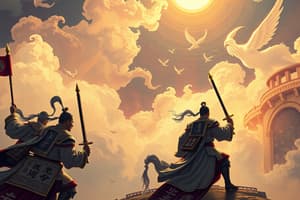Podcast
Questions and Answers
What does Chapter I of The Art of War refer to?
What does Chapter I of The Art of War refer to?
Laying Plans
According to Sun Tzu, what is the art of war?
According to Sun Tzu, what is the art of war?
Of vital importance to the State
What are the consequences of neglecting the art of war?
What are the consequences of neglecting the art of war?
It can lead to either safety or ruin.
What are the five constant factors governing the art of war?
What are the five constant factors governing the art of war?
What does the Moral Law cause?
What does the Moral Law cause?
What does Heaven signify in the context of The Art of War?
What does Heaven signify in the context of The Art of War?
What does Earth encompass?
What does Earth encompass?
What virtues does the Commander possess?
What virtues does the Commander possess?
What is meant by Method and discipline?
What is meant by Method and discipline?
Who will be victorious according to Sun Tzu?
Who will be victorious according to Sun Tzu?
Which principle is important for a sovereign to maintain harmony with subjects?
Which principle is important for a sovereign to maintain harmony with subjects?
The art of war is of little importance to the State.
The art of war is of little importance to the State.
What constitutes the five constant factors in the art of war?
What constitutes the five constant factors in the art of war?
Flashcards are hidden until you start studying
Study Notes
Chapter I: Laying Plans
- Sun Tzu emphasizes the critical importance of the art of war for the State.
- War decides life and death; it is essential to analyze and prepare thoroughly.
- Five consistent factors influence success in military strategy.
Five Constant Factors
- The Moral Law: Reflects harmony and creates unyielding support for the ruler, even in dire circumstances.
- Heaven: Encompasses natural elements such as day, night, seasons, and weather conditions. Understanding these can influence military decisions.
- Earth: Considers physical geography, including distances, terrain features, and the balance between danger and safety.
- The Commander: Involves key virtues: wisdom, sincerity, benevolence, courage, and strictness, which determine a leader's effectiveness.
- Method and Discipline: Refers to organization within the army, proper supply routes, clear rank structure, and fiscal control over military resources.
Evaluation for Military Conditions
- Key comparisons to assess military readiness:
- Alignment of the sovereign with the Moral Law and subjects' harmony.
- Ability and competence of generals.
- Advantages of natural conditions and environmental factors.
- Stringency of discipline in the military.
- Overall strength, both moral and physical, of the army.
- Training consistency among troops, ensuring effective preparation for battle.
Importance of Deliberation
- Consistent understanding of these factors is essential for military leaders to ensure victory.
- Failure to grasp these elements leads to inevitable defeat.
Conclusion
- A systematic approach to planning, focusing on these five factors, is fundamental in achieving strategic advantages in warfare.
Studying That Suits You
Use AI to generate personalized quizzes and flashcards to suit your learning preferences.




